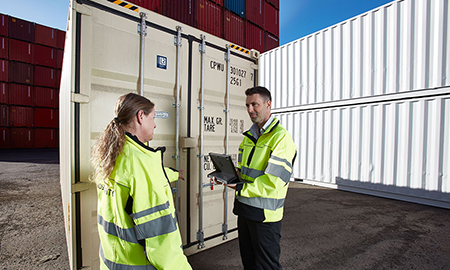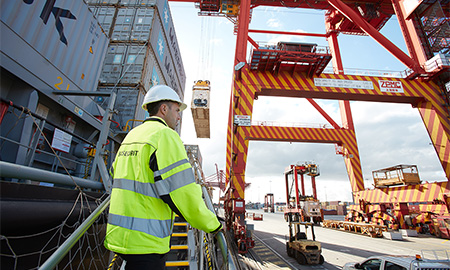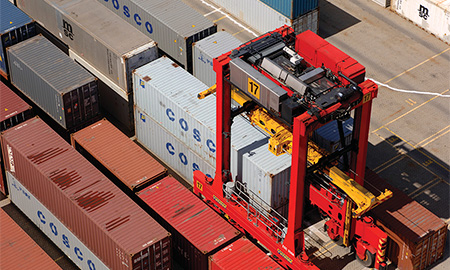We ensure that all goods, conveyances and travellers meet Australia’s biosecurity import conditions and that food imported into Australia and intended for sale meets food safety requirements.
We are responsible for operational policy and front-line regulation to manage biosecurity and imported food risk, and the delivery of assessment, inspection, stakeholder engagement and client contact services.
Our front-line staff inspect and assess thousands of consignments annually to prevent biosecurity threats entering our country and to protect human health. These threats pose significant risks to our environment, agriculture industries and way of life.
Working with all stakeholders in the importing and shipping industries enables us to deliver these activities.
Our client service standards
As part of our commitment to continuous improvement in service delivery, we have established client service standards that outline the level of service you can expect from us.
Our performance report for client contact services, import services and export services provides a quarterly update of how we are performing against these standards.
Client service standard results: July to December 2025
If you have difficulty accessing these files, contact us for help.
Operational updates
Sharing information with our stakeholders helps us achieve our goals.
See our recent significant biosecurity operational updates. You can also check all import industry advice notices.
Check our imported food notices for updates on imported food safety requirements. Subscribe to be notified of new releases.
Pre-border biosecurity treatment providers and import and shipping industries stakeholders associated with importing goods fumigated with ethyl formate are advised that ethyl formate (EF) in combination with carbon dioxide (CO₂) is a new biosecurity treatment for Brown Marmorated Stink Bug (BMSB) from 1 September 2025 and the Ethyl formate fumigation methodology (version 1.0) has been published on the Methodologies and documents for biosecurity treatments webpage.
Biosecurity industry participants that manage oversize tyre inspections at first points of entry and class 1.1 approved arrangement premises are advised that the oversized tyres presentation and treatment guide has been published on the department’s website.
The guide can be found on the ‘Importing Tyres’ webpage.
Food importers and Customs brokers are advised that BICON cases documenting the food safety requirements that apply to food imported into Australia that is intended for sale, were released on 15 June 2025.
Import-related biosecurity treatment stakeholders, including importers, Customs brokers, onshore approved arrangement holders, and overseas government and industry treatment providers are advised of the updated methyl bromide treatment methodology coming onto force on 1 May 2025.
Customs brokers and importers responsible for the importation of military goods, including machinery, vehicles, aircraft, vessels military working dogs, meals-ready-to-eat, packs and webbing, and personal equipment are advised of the new BICON case Goods for military use intended to assist in understanding import requirements as they relate to military goods.
Biosecurity news
See our latest biosecurity news items.
Ensuring biosecurity operations are future ready
June 2025
Writing in the Freight and Trade Alliance’s Across Borders 2025 Annual Review magazine, Monica Collins, First Assistant Secretary, Biosecurity Operations Division outlines the work underway to ensure Australia’s biosecurity systems are future ready.
Engaging with industry on our biosecurity operations
April 2025
Monica Collins, Head of Biosecurity Operations, is committed to progressing efforts to meet regulatory obligations and adapt to the changing environment.
Updating industry on our biosecurity import clearance reforms
April 2025
Staying at the forefront of biosecurity, our leaders are committed to sharing insights and updates from key industry events.
Broker toolkit
- Biosecurity Import Conditions system (BICON)
- Imported food
- External territories
- Specific commodities
- Applying for an approved arrangement
- Broker approved arrangements (class 19)
- Requirements and conditions for Non commodity for containerised cargo (NCCC)
- Requirements and conditions for Automatic entry processing for commodities (AEPCOMM)
- Compliance classifications for class 19 approved arrangements
- Approved commodities and related information for class 19.2 approved arrangement
- Automatic Entry Processing (AEP)
- Training and accreditation
- Continued Biosecurity Competency (CBC) activities
- Variations, revocations and change of details
- Fees and charges
- Imported food
- Pre border
- Brown marmorated stink bug (BMSB) treatment providers scheme
- Australian Fumigation Accreditation Scheme (AFAS)
- Ethylene oxide (ETO) offshore treatment providers scheme
- Gamma irradiation offshore treatment providers scheme & facilities
- Offshore cleaning and pre-inspection of used vehicles
- Sea container hygiene system
- Post border
- Approved Arrangement
- Biosecurity risk treatment guide
- Offshore schemes
- Offshore treatment providers
- Onshore treatment sites
- Sea container cleaning standards
- Waste
- Request to have import documents assessed outside business hours
- Imported food inspection scheme laboratory nomination form
- Movement advice for animal transport equipment
- Notification of container and break bulk discharge
- Reportable biosecurity incident form
- Request for inspection form
- Request for permission to dispose of goods/conveyance
- Acceptable documentation templates
- Booking an inspection
- Sites operating under an approved arrangement
- Cargo Container Verification (CCV)
- Fees
- Forms
- Be biosecurity aware - See. Secure. Report.
- How to import guide
- Cargo containers: biosecurity aspects and procedures
- Biosecurity treatments and fumigants
- Treatment providers



